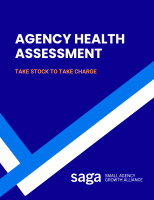What business owner hasn’t at least mused about the possibility of selling one day? For many PR and marketing agency owners, they may be dreaming about using the sale of their firm as a stepping stone toward a secure retirement or the freedom to do something different later in life.
But how do you know how much you might be able to sell your agency for? That’s a question that I get quite often from owners.
The truth is that the value of your agency is whatever amount a buyer is willing to pay and you are willing to accept.
Obviously, that’s not a satisfying answer when I give it, so let’s move on to some guidelines that can help you get some idea as to what you might be able to achieve.
The starting point
If you forced me to provide a formula for the value of a PR or marketing agency, I would tell you that it is somewhere between 4 and 6 times the annual profits (or EBITDA for those who want to indulge in accounting terminology). In mergers and acquisitions, that is often referred to as a “4 to 6 X multiple.”
Of course, that’s just a starting point.
Many things influence where within that range you might fall – and some things might even cause you to move above or below the rule-of-thumb multiple.
But first we need to look at how profits are calculated.
The profit problems
The reality is that most small agencies calculate their profits incorrectly. So before you even think about starting to multiply the profit number that you have in your mind, let’s make sure that it is computed in the same way that a buyer might.
The biggest item that can distort agency profitability is the owner’s compensation. It is important to remember that as an owner you get paid two ways: once for the work that you do for the business (via a salary or similar method) and once for the risk of being an entrepreneur (via dividends or draws).
Many owners just take a draw out of profits and don’t even pay themselves a salary. Profits must be calculated after the owner’s reasonable compensation has been removed, otherwise your profit margin will be grossly overstated.
At the same time, some owners over-compensate themselves in order to achieve beneficial tax treatment. For instance, you might be able to legitimately funnel certain expenses through the business to get tax deductions or you might have the business provide extraordinarily generous benefits. To the extent that any of these costs are beyond what a buyer might reasonably believe are necessary, they can actually be added back to your profits to improve the valuation.
Essentially, you need to review all of your expenses to make certain that they would be items that a typical buyer would expect. This process of “normalizing” your profits will give you a number that you can use to calculate your multiple.
Factors that can improve your multiple
If you saw that 4 to 6 times profits is a typical valuation, you may have been disappointed. After all, that means that you are only banking a few years of “guaranteed” profits – and that assumes that you aren’t growing. The faster you are growing, the fewer years that multiple represents.
So what factors might sweeten the pot a bit for you?
- Consistent growth. If your revenue and profits have continued to grow in each of the past 3 years (the standard look-back window for most buyers), then it shows your agency is on a good trajectory and buyers will typically reward that since it makes them more optimistic that the numbers will improve under their ownership, too.
- High growth rates. It’s nice to grow every year, but it is even better when that is double-digit growth. The more growth that you are showing, the more impressive it is to a buyer.
- Diversified revenue. Many small agencies have at least one client that represents more than 25 percent of their annual revenue. If your revenue is well-balanced and you don’t have any of these whale clients, that tends to indicate less risk for the buyer and improves the multiple.
- Recurring/retainer revenue. Ongoing revenue streams tend to satisfy buyers more than project-based income because it increases their comfort level with financial projections.
- Strong leadership team. If you have surrounded yourself with a strong set of players and made it so that the agency can thrive without your personal involvement in day-to-day activities, that presents another sign of stability that buyers like to see.
- Desirable focus. Certain industries and service offerings can be especially sought after based on broad market conditions. If larger agencies find themselves behind the times or want to expand into a certain market, it can create a feeding frenzy for agencies that specialize in those areas. In recent years, digital and health care agencies have been of particular interest, but the specific desirable characteristics will shift over time.
- Buyer-specific checkboxes. If you find a potential buyer who sees some additional strategic value in the acquisition – geography, industry, service offerings, etc. – then they will apply a stronger valuation. In those cases, they are looking beyond the immediate revenue generation and foresee other ways that it will contribute to the growth of their own business.
There are any number of other factors that can improve your valuation, but these represent some of the most common.
It is important to understand that each buyer is different, so what one may be willing to offer could be wildly different from another – and that’s not necessarily because of negotiating tactics but because they have different visions for how you will fit and what they need.
Factors that can limit your multiple
Just as there are items that can drive your valuation higher, there are things that may hold you back – at least for many potential acquirers.
Most of these items represent potential risks for a buyer that they will want to mitigate by paying less for your firm. Many are the flip side of those things that can increase your valuation.
- Limited track record. If your business has only been around for a couple of years, you don’t have enough history for many buyers to judge. At a minimum, it likely means that any offer won’t be based on a true multiple calculation and will use some other method to determine an offer price.
- Slow or negative growth. If the waters have been choppy for your firm in recent years or your results have been inconsistent, then buyers will likely discount the valuation. You will need to explain any bumps along with the steps that have been taken to address them.
- Small size. The smaller you are – both in terms of revenue and headcount – the more likely a buyer is to reduce their valuation. When you are small (less than $1 million in annual revenue), the cost in time and money to complete an acquisition and integrate it with their own business may be too high. It is also less likely that you have a structure of repeatable processes that can assure them of future projections.
- Client concentration issues. If you have one or more whale clients that represent more than 25% of your revenue apiece. Similarly, if you have multiple clients who have a single corporate parent or who are so closely aligned that their fortunes will rise and fall with each other, that’s a red flag for many buyers and the valuation will reflect that risk.
- High client churn rates. Some agencies are really good at selling to new clients but not so good at keeping the ones that they have. If you have retention problems, that will typically sound an alarm for buyers and they will reduce their offer accordingly.
- Owner-centric culture. If your agency relies upon you for business development, client service, and general administration, that’s a problem for most buyers. To get the highest price for your business, you need to convince the buyer that it will continue on without you and the success won’t disappear when you do.
- Liabilities and risks. Anything that can make a potential buyer uneasy can reduce the valuation that they apply when making an offer for your firm. Examples include messy partnership breakups, public disputes with clients or vendors, controversial political activity, disputes with former employees, lawsuits, large amounts of debt, and other similar items. To the extent that you have any of these, it is important to get in front of them in your conversations with the buyer so that they don’t emerge for the first time during a due diligence process.
Just as with improving the valuation, there are certainly other items that might go on this list, but ultimately it depends on the individual buyer and what their interests and concerns might be.
It’s not just about the money
Selling your agency isn’t the same as trading in your used car. There are a lot of factors that you need to consider as part of any acquisition offer that you may receive.
Since few if any agency purchases are all-cash, you need to understand how each part of the deal works so that you can better understand what it means for you financially.
That’s why the whole valuation conversation is a bit overblown. It’s nice to get some idea of what your business might be worth on a piece of paper, but how that value translates into money in your own pocket is very different.
Often M&A deals for agencies fall apart not over the actual cash terms, but all of the other strings that come attached. Even those acquisitions that are completed may end up dissolving before any earnout period concludes because of non-financial dissatisfaction on the part of the selling owner.










